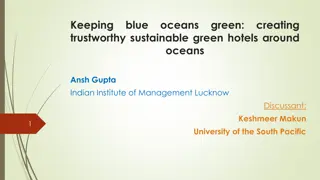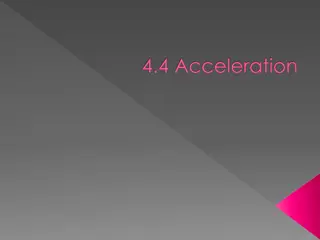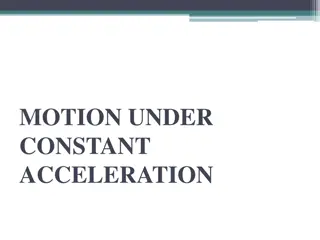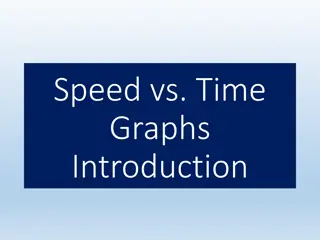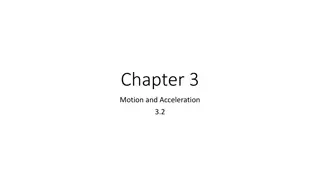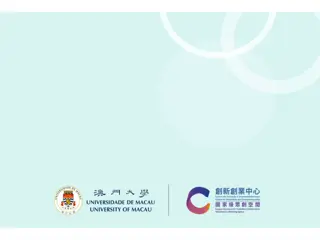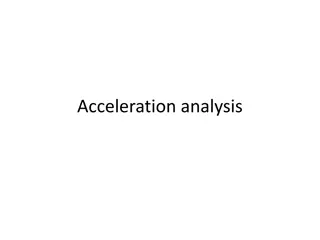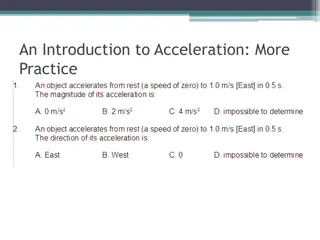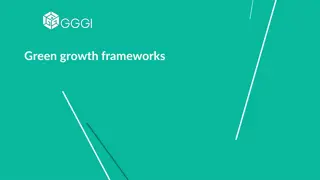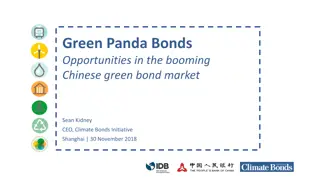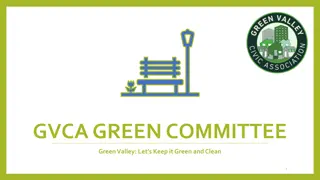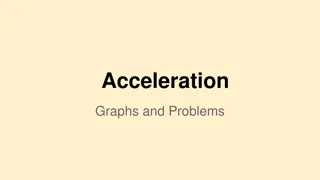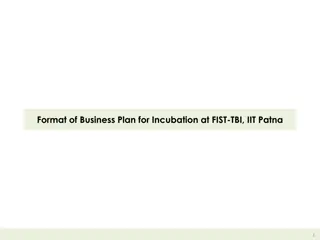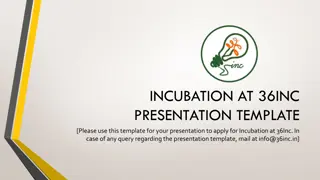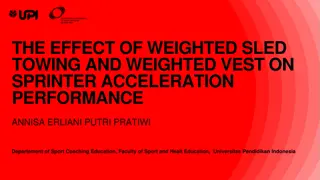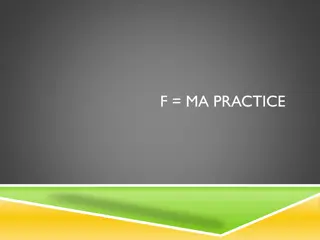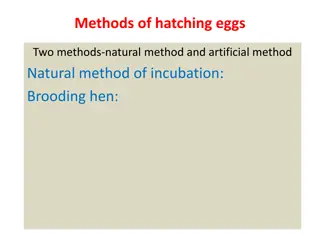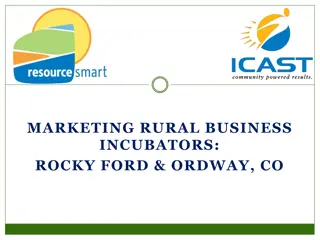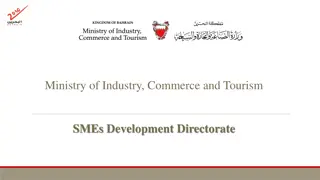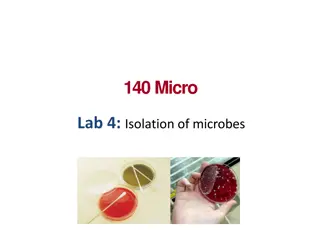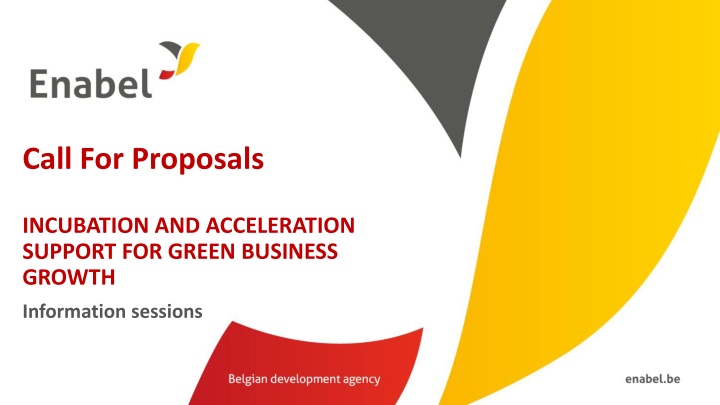
Incubation and Acceleration Support for Green Business Growth
This program offers support for green businesses in Uganda, focusing on incubation, acceleration, and job creation. It aims to empower young people and women to develop economically in a sustainable society while promoting quality education and healthcare.
Download Presentation

Please find below an Image/Link to download the presentation.
The content on the website is provided AS IS for your information and personal use only. It may not be sold, licensed, or shared on other websites without obtaining consent from the author. If you encounter any issues during the download, it is possible that the publisher has removed the file from their server.
You are allowed to download the files provided on this website for personal or commercial use, subject to the condition that they are used lawfully. All files are the property of their respective owners.
The content on the website is provided AS IS for your information and personal use only. It may not be sold, licensed, or shared on other websites without obtaining consent from the author.
E N D
Presentation Transcript
Call For Proposals INCUBATION AND ACCELERATION SUPPORT FOR GREEN BUSINESS GROWTH Information sessions
Presentation outline 1. Introduction to WeWork and the Call for Proposals 2. Objectives of the call 3. Admissibility criteria a. Actors b. Actions c. Costs 4. Concept note application form 5. Application and selection procedure
Call for Proposals Guidelines, annexes, clarifications (Q&A) and all other communication: www.enabel.be/grants Call reference number: UGA22003-10040 Call Title: Incubation and acceleration support for Green Business Growth Procedure: 2 phased : (1) Concept note stage, (2) proposal stage
Enabel Country Portfolio Overall Objective General objectives Young people and women in Uganda develop into active, economically independent citizens in a sustainable society that respects human rights and ensures quality basic services WeWork Green and Decent Jobs for Youth Pillar 1 Young people, especially young women, acquire skills and find decent jobs or entrepreneurship opportunities in agriculture and the green and sustainable economy Pillar 2 The right to safe and quality education and health care is more transparently ensured, in particular for vulnerable groups including children, girls and women, and refugees
WeWork Green and Decent jobs for Youht Overall Objective Contribute to sustainable economic growth and decent job creation in Uganda Specific Objective Increase the employability of youth, women and men, supply of qualified workers, and access to decent employment
WeWork Business support R4/OP2.1 Sustainable micro- & small business devt (resilience track) R5/OP2.3 SME growth tracks (decent job creaton, greening) OP 2.2 Ideation, incubation & acceleration of young enterprises(growth, innovation) 3500 youth supported to start or grow sustainable micro- or small business 115 SMEs supported to unlock growth and decent job creation potential 100 dynamic and innovative young enterprises supported to launch and scale Technical assistance track Greening track (UCPC) + strengthening of the start-up ecosystem (structures)
2. Call Objectives General objective To contribute to the Ugandan private sector in realising sustainable development for green growth and decent jobs. Specific objective To unlock the growth potential of at least 70 innovative start-ups and scale-ups in the Green and Circular Economy (CGE) through incubation and acceleration support and resulting in the creation of at least 250 new, decent jobs.
2. Call Objectives outputs (overall) 1.At least 50 early-stage businesses in the CGE are supported to successfully launch their business in the market and realise growth through incubation = lot 1 2.At least 20 scale-ups in the GCE are supported to scale their business models through acceleration = lot 2
2. Call objectives Outputs (overall) Lot 1 - Incubation Call output 1 (lot 1): At least 50 early-stage businesses in Green and Circular Economy are supported to successfully launch their business in the market and realise growth through incubation Minimum results lot 1 ( business growth): At least 20% revenue growth at the end of the action for enterprises participating in incubation programmes On average 3 new, direct or indirect decent jobs created per enterprise at the end of the action
2. Call objectives Results (overall) Lot 2 Acceleration Call output 2 (lot 2): At least 20 scale-ups in the GCE are supported to scale their business models through acceleration Minimum results lot 2 ( business growth): At least 50% growth in turnover On average 5 new, direct or indirect decent jobs created per enterprise at the end of the action
2. Call volume and grant amounts The overall amount available for this call is EUR 1,200,000 allotted as below; Lot 1: Incubation = EUR 300,000 Minimum requested amount = EUR 150,000 Maximum requested amount = EUR 300,000. Lot 2: Acceleration = EUR 900,000 Minimum requested amount = EUR 450,000 Maximum requested amount = EUR 900,000.
3. Admissibility criteria 3 levels A) The actors: Admissible applicants B) The actions: Admissible actions for grants C) The costs: Admissible types of costs that may be included in grants
3a. The actors: (lead) applicant Be a legal entity; Be a Public entity or a private not for profit entity or foundation; Be established or represented in Uganda (= registered in Uganda!); Be a national or international non-profit Business Development Service Provider OR a semi- autonomous Business Development Service Provider in case of public entities; Be directly responsible for the preparation and management of the action with the co- applicant (where applicable) and not be acting as an intermediary; Have demonstrated local expertise and experience in managing and delivering quality business development initiatives for incubation (lot 1) or acceleration (lot 2) of dynamic, young enterprises in the Green and Circular Economy in Uganda, for at least the past 2 years; For applications under lot 2 only: Have an existing collaboration or partnership with financiers or investment funds and/or demonstrated records of raising funds for SMEs (to be demonstrated for the (lead) applicant OR any co-applicant); Have an active Bank Account for the past 12 months; Have in-house financial management capacity.
3a. The actors: (lead) applicant Exclusion grounds: Annex VII grant agreement Applicant s declaration in application form completed and signed (PART A application form Annex A) Supporting documents (upon preselection 2ndstage only): Criminal record clearances from Interpol NSSF clearance certificate Tax clearance certificate
3a. The actors: Co-applicants The applicant may act individually or form a partnership and act with one and maximum two co-applicants (not obligatory!) The partnership between lead and co-applicants is to optimize cumulation of complementary expertise. The selected applicant becomes the contracting-beneficiary and is the main point of contact for the contracting authority. It shall represent its co-applicant and act in their name. It shall design and coordinate implementation of the action. The co-applicant shall participate in the implementation of the action and the costs that they incur shall be eligible in the same way as those incurred by the lead applicant. Any co-applicants must sign a mandate in 2nd/proposal stage (Annex A, part B) Same admissibility criteria as for (lead) applicants
3a. The actors: Associates Participate actively in the action, but are not eligible for grants and only qualify to receive daily allowances and travelling expenses. To be specified in part B of the application form (annex A). They need not to sign the mandate in 2nd/proposal stage.
3a. The actors: Contractors These are contractors for services, works and equipment. These must be sourced through a procurement process using relevant procedures i.e. PPDA (public procurement law) for public entities and annex VIII of the Grant Agreement for private entities
3b. The actions An action comprises a series of activities that are necessary to achieve the results and contribute to the specific(s) objective(s) pursued by the application 1. Duration 2. Geographical coverage 3. Sector themes 4. Target groups 5. Type of action and eligible activities
3b. The actions: Duration Action duration = grant agreement/project duration Lot 1 Incubation Minimum 15 to maximum 24 months (excluding 3 months grant closure) Lot 2 Acceleration Minimum 15 to maximum 33 months (excluding 3 months grant closure)
3b. The actions: Target groups & sector Young, innovative, dynamic and demand-driven enterprises in the Green and Circular Economy (CGE), i.e.. with potential to grow/scale, and, as such, contribute to job creation Green and Circular Economy (CGE) Contribution to healthy and sustainable eco-systems Reduction of carbon emissions, pollution and waste in production and consumption; Promotion of energy efficiency, saving of natural resources, and regenerative systems; and/or Production of green goods and services.
3b. The actions: Target groups & sector Lot 1 - Incubation Early-stage entrepreneurs looking to refine their business ideas and develop innovative, green solutions basic proof of concept (PoC) and initiated market testing/exploration; potential for innovation in the Green and Circular Economy; market-driven and demonstrate potential for scalability; Have a product prototype and/or are undergoing product testing or research and development.
3b. The actions: Target groups & sector Lot 2 Acceleration More mature enterprises and scale-ups that have a market-ready solution and are looking to scale their solutions validated Minimum Viable Product (MVP) or beyond; potential for innovation in the Green and Circular Economy; demonstrate market traction, have a track record of financial sustainability and ability to absorb (additional) finance, and showing readiness for scaling regionally or globally; demonstrate growth realized, in terms of number of staff and a minimum annual turnover of 20,000 EUR; highly motivated and committed teams willing to learn and ready to take action on the business insights learned.
3b. The actions: Geographical coverage Lot 1 Incubation The actions under lot 1 must target enterprises/entrepreneurs operating in Uganda, in the following subregions: Kampala metropolitan area, Busoga and West Nile, and in the following priority districts (incl cities): Kampala Metropolitan Busoga West Nile Kampala Wakiso Mukono Kamuli Jinja Madi-Okollo Terego Adjumani Arua Yumbe Kiryandongo During implementation: Selected applicants are expected to actively source participant enterprises in all 3 subregions during implementation, aiming for 70% KLA & 30% BUS&WN Selected applicants may consider as well supporting enterprises in other districts within the subregions of focus, if envisioned outcomes in terms of growth and decent job creation are significant and well-justified, and if there are opportunities for market linkages or employment creation in the prioritized districts
3b. The actions: Geographical coverage Lot 2 Acceleration The actions under lot 2 must target enterprises operating in Uganda, in the following subregions: Kampala metropolitan area, Busoga and/or West Nile. Selected applicants might consider as well supporting enterprises operating in other, surrounding subregions, if envisioned outcomes in terms of growth and decent job creation are significant and well-justified, and if there are opportunities for market linkages or employment creation in the prioritized sub-regions.
3b. The actions: Types of actions Lot 1 : Incubation programmes Lot 2: Acceleration programmes (holistic) Other types of actions = inadmissible
3b. Strategies promoted = evaluation criteria Lot 1 Incubation Business development training and tailored technical assistance and mentorship; Entrepreneurial soft skills development; Access to well-equipped co-working spaces and technology that allow pitching, networking and prototyping activities; Engagement and partnerships with private sector actors to leverage existing business knowledge and expertise in the CGE in training, mentoring/coaching or peer-to-peer learning + facilitate development of business relationships (ie. integration in business networks, facilitation of B2B partnerships, facilitation of sales or distribution agreements etc); Strategies to enhance access to affordable finance and capital, along with support in pitching for; grants/seed funding, preparing for investment readiness, matchmaking with formal or non-formal credit opportunities.
3b. Strategies promoted = evaluation criteria Lot 2 Acceleration Tailored technical assistance and mentorship Strategies to support access to new (local or international) markets, eg. access to market research, legal advice and guidance on compliance with regulatory frameworks and environmental standards, support to achieve certifications (e.g. eco-labels, EUDR or ISO environmental certifications) etc; Sector-specific technical support in product development and/or diversification focusing on sustainability and innovation, including adoption of new, green technologies; Engagement and partnerships with private sector actors eg to leverage business knowledge and sector-specific expertise, promote B2B, sales agreements etc; Strategies to enhance access to affordable finance and capital, ie. building investment readiness, matchmaking with financiers who are looking to invest in sustainable, scalable businesses; Strategies to promote adherence to decent work principles.
3b. Strategies promoted = evaluation criteria Both lots Outreach & awareness activities and proper selection procedures; Inclusion strategies (mainstreaming* and/or promoting equal access to decent employment) Innovative approaches, good practices, new technologies Adherence to quality standards M&E and knowledge mgmt.
3b. Sub-grants to sub-recipients Optional, not mandatory (but strong value for money and alternative strategies if not included) Restricted to specific categories (other categories inadmissible) Lot 1 Incubation : Seed grants Lot 2 Acceleration : matching grants or loan-matching grants Restricted to conditions per category
3b. Conditions sub-grants lot 1 = Seed grants Maximum 30% of the total budget of the action Max EUR 5000 per selected enterprise; Any seed grants must be non-refundable; Supported enterprises must have successfully completed the incubation programme organized under the action and developed/refined the necessary documents as defined and guided by the applicant (eg. business plans, investments proposals, financial projections, ...); Approval of seed grants for supported businesses will be done by a selection committee which is to include representatives of Enabel, and by applying key selection/awarding criteria (competitive)
3b. Conditions sub-grants lot 1 = Seed grants Eligible costs for seed grants: Business set-up costs (equipment, raw materials, working capital etc) Marketing, market research and market testing activities; Technology adoption; Product research and development activities; Compliance with legal and regularity requirements (costs for legal services to secure licenses, product or service copy rights, product certifications, licenses and permits to operate legally); Fundraising costs such as travel costs to investor events in preparation for investment readiness; Other activities that are be linked to the launch and growth of an enterprise. Non-business-related costs (e.g. personal expenses or assets) and repayment of existing debts or loans cannot be eligible for seed funding.
3b. Conditions sub-grants lot 2 - Acceleration Matching grants to enterprises supported under the action Eligible enterprises must contribute a minimum of 50% of the required investment (1:1 ratio); AND/OR Loan-matching grants to financiers providing credit to the enterprises supported under the action to repay a % of the loan new and regulated loan/investment during participation in the acceleration for investments linked to growth strategy. Loan-matching grants cannot exceed 30% of the loan amount raised by an enterprise (and cannot exceed EUR 30,000). To be paid to the financier (as a formalized re-imbursement on the borrower account).
3b. Conditions sub-grants lot 2 - Acceleration Maximum 40% of the total budget of the action Max EUR 30,000 per selected enterprise; Any matching grants or loan-matching grants must be non-refundable; Approval of (loan-)matching grants for supported businesses will be done by a selection committee which is to include representatives of Enabel, and by applying key selection/awarding criteria
3b. Conditions sub-grants lot 2 - Acceleration Eligible costs for (loan-)matching grants: Market expansion and acquisition activities; eg. market research, marketing, branding and advertising activities or materials; Product or service development and diversification; eg product research and development to enhance quality and/or diversify to enhance market access; Technology adoption; Implementation of sustainability initiatives; Investment in working capital; Acquisition of the essential equipment; Activities/costs aimed at obtaining certification to be able to access regional and global markets; Other Initiatives that are linked to the growth of an enterprise.
3b. The actions: Admissible activities Sub grants Eligibility of the costs under sub grants For Both Lot 1 and 2; The description of the objectives and results to be achieved with these sub- grants, the fundamental principles, the key concepts, the mechanisms, the actors and their role in the management process; The criteria and modalities for the allocation of grants, accessibility conditions sub-beneficiaries, conditions for the admissibility of sub-projects, eligibility conditions for activities, costs and expenses; The procedures for examining and awarding applications; The maximum amount that can be allocated by sub-beneficiary; The terms of contractualization with the sub-beneficiary; The procedures and modalities for disbursing resources; The procedures and modalities for technical and financial monitoring; The procedures and modalities of control.
3b. Sub-grants to sub-recipients Applicants selected to go to 2nd/proposal stage need to elaborate: 1. The description of the objectives and results to be achieved with these sub- grants, the fundamental principles, the key concepts, the mechanisms, the actors and their role in the management process; 2. The criteria and modalities for the allocation of grants, accessibility conditions sub-beneficiaries, conditions for the admissibility of sub-projects, eligibility conditions for activities, costs and expenses; 3. The procedures for examining and awarding applications; 4. The maximum amount that can be allocated by sub-beneficiary; 5. The terms of contractualization with the sub-beneficiary; 6. The procedures and modalities for disbursing resources; 7. The procedures and modalities for technical and financial monitoring; 8. The procedures and modalities of control.
3b. Number of applications The applicant cannot submit more than one (1) application per Lot under this Call for Proposals. The applicant cannot be awarded more than one (1) Grant Agreement per Lot under this Call for Proposals. The applicant cannot be at the same time a co-applicant in another application A co-applicant cannot be awarded more than one (1) Grant Agreement per Lot under this Call for Proposals
3c. Admissible/ Ineligible costs Admissible / Eligible Costs: Costs that Enabel can subsidize under any Grant Agreement 1) Direct costs Operational Costs Management Costs (Direct Administration Costs). 2) Indirect Costs: Structure Costs (Indirect Administration Costs) Two Types: Directs Costs Indirect Costs
3c. Admissible/ Eligible costs ii) Management Costs: Direct costs Administration costs directly attributed to the implementation of the actions. This comprise the costs of management, monitoring, equipment, facilities and other costs directly related to the core activity. Examples: IT/Computer equipment(Laptops, printers, projectors, Camera etc.) Furniture and fittings Audit & Accounting fees Salary of program staff + other direct staff Etc. i) Operational Costs Activity costs necessary for achieving the results of the action. This comprises the costs of the core activities to be implemented. Examples: Training materials Food for trainees Transport costs for trainees or attend training workshop Training fees Etc.
3c. Admissible/Ineligible costs Indirect Costs: Structure Costs: Administration costs not directly attributed to the project, but are necessary for the implementation of the actions Max 7% of operational costs, and to be verified Examples: Office rental Utilities: electricity, water, etc. for project office Salary of the Executive Director or + other support staff Office telecommunication cost Etc.
3c. Admissible/Eligible costs Reserve for contingencies: The budget may include a contingency reserve up to a maximum of 5% of the estimated eligible direct costs It may only be used during implementation with the prior written authorization of Enabel
3c. Ineligible costs Subcontracting by means of service or consultancy contracts to personnel members, Board members or General Assembly members of the organization subsidized Any sub-letting to oneself Purchases of land or buildings; Compensation for damage falling under the civil liability of the organization Employment termination compensation for the term of notice not performed Purchase of alcoholic beverages, tobacco and derived products thereof Salary bonuses Accounting entries not leading to payments Provisions for liabilities and charges, losses, debts or possible future debts Debts and debit interests Doubtful debts Currency exchange losses Loans to third parties Guarantees and securities; Costs already financed by another grant Invoices made out by other organizations for goods and services already subsidized
3c. Indicative Costs Rule: Apply OWN policies and procedures BUT within Limits below: TRAVEL ALLOWANCES_LDPG Policy + Country Manual apply: Perdiem per Overnight UGX 80,000 (40% Dinner, 30% Lunch,20% Teas, 10% Incidentals) Accommodation ( Bed & Breakfast) Maximum UGX 150,000* For Kla metro,Jinja,Fortportal,Mbarara,Gulu,Arua, AND other districts 100k Full day overnight Allowance maximum UGX 230,000 (80k+150k) SDA UGX 25,000 ( Work outside duty station >6hours) Transport Refund : Based on Mileage rate, currently 715/km and 7km per Litre, google maps, or Actual Public Means rates, Air Tickets & Visas, Actual rates.
3c. Indicative costs Cont`d Honorarium / professional fees to own staff /government Officials _Not allowed. Being Reviewed. Consultancy Fees ( Company): Procurement Rules apply depending on assignments: usually <= Eur 300 per day_ Covering all costs for Local Consultancies, and <=Eur 600 for international consultancies. Facilitation fees Individuals - Presentation of Papers / Training, per day ;UGX 80,000 Communications : )Airtime and Data/ Internet) Participants Online sessions >2hrs Max 30,000 per day, below 2hrs max 15,000 Staff : Per Month ; Support & Operations ( Max 110k)
3c. Other considerations: Efficiency: Ratio Management Costs to Operational Costs: >=70%:<=30% Budget for CfP only at high level: Ops Costs, Mgmt, & structure costs Aligned to : Log frame and Operational planning Treasury Management (Transactional Exchange rates, Forex Gains and losses) is the responsibility of partner.
3c. Budget estimation Budget (in EUR) S/NO Category of expenses Activity 1 Operational costs 2 Management costs Structure costs (maximum 7% of operational costs) Total 3


